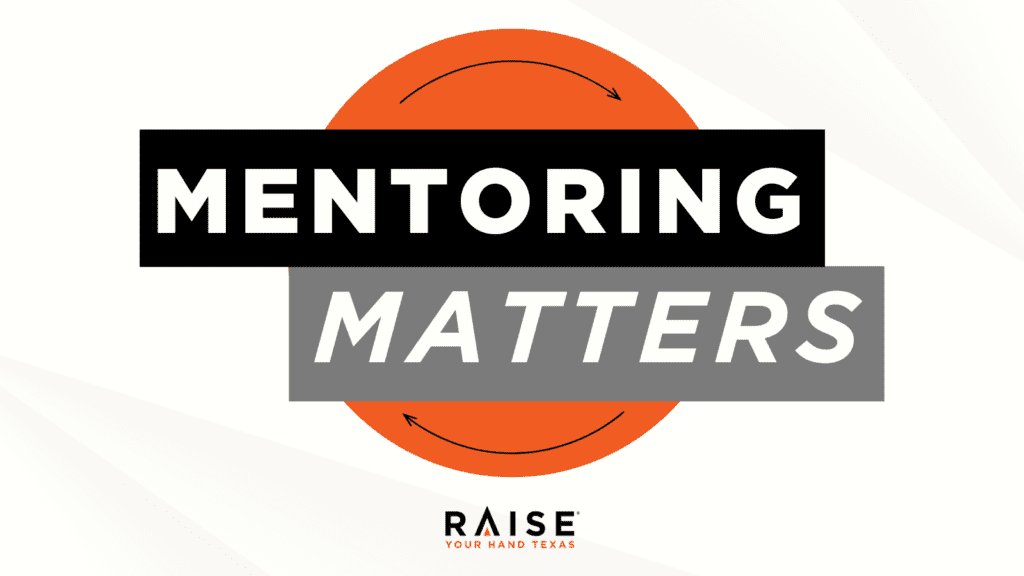
categories
Investing in Teacher Mentorship Leads to Stronger Classrooms

May 12, 2023
An increased investment in mentorship is essential at this point in the Texas teacher workforce crisis. It is imperative that we retain new teachers in the field and provide the best possible instruction to Texas students. High-quality mentorship paves the way for both.
The Texas Education Agency’s (TEA) Teacher Vacancy Task Force recently recommended developing statewide mentor training, as well as scaling funding for the Mentor Program Allotment (MPA), the latest state program to support teacher induction. The MPA was created by House Bill 3 in 2019, so more teachers who are new to the teaching profession may receive quality training each year.
High-quality mentorship for new teachers can increase retention and provide effective instruction. Research also demonstrates that mentoring is an investment that will pay dividends by keeping teachers in the classroom. Yet state funding for high-quality mentorship programs has been inconsistent and inadequate over the past two decades. The current program under the MPA has served approximately 3,300 teachers to date, which is around 10% of the beginning teacher corps, about 30,000 teachers, and 1% of all teachers across the state, approximately 300,000 teachers.
New programming opens the door for promising results, but the state must make a greater investment in high-quality mentorship for all beginning Texas public school teachers.
What are the benefits of high-quality mentoring?
Mentoring, the practice of an experienced teacher providing individualized instructional support to a first- or second-year educator, is an essential part of teacher induction.

High-quality mentoring happens when a veteran teacher, known as a mentor, engages in a collaborative relationship with a beginning teacher, known as a mentee, to observe, provide feedback, listen, and plan during a time period dedicated to this purpose, often referred to as “release time.” Feedback and support often focus on effective instruction and classroom management, with the goal of strengthening the mentee’s practice and benefitting student achievement and teacher retention.
Programs for new teachers that prioritize improving instruction and teacher effectiveness have been proven to increase teacher retention and student achievement. An analysis of national data found that a comprehensive induction program cut the new teacher turnover rate in half.
Research also finds that mentoring can be a vital piece of the puzzle to fill in the gaps for preparation of teachers from intern and non-licensure routes to the profession.
While all new teachers could certainly benefit from high-quality mentoring, not all beginning Texas teachers receive this support. Teachers who are certified through traditional university programs receive some mentorship from their cooperating teacher during their student teaching semester, typically their final semester prior to graduation and becoming a teacher of record. Although many independent school districts (ISDs) operate their own mentorship programs for first- and second-year teachers, there is no state requirement for these teachers to be assigned a mentor during their first years in the field or any requirements regarding the quality of these programs.
For teachers who are certified via alternative certification programs (ACP), there is a requirement for teachers to have a mentor during their first year as a teacher of record, since ACP candidates do not participate in student teaching prior to entering the classroom. These candidates may become a teacher of record after completing half of the required training hours. Although the mentorship is required by State Board of Educator Certification (SBEC) rules, there is little oversight over the quality and consistency of mentor placement and practices.

After working in a different field for more than 10 years, Jerome Johnson joined Channelview ISD to become an 8th-Grade Reading and Language Arts teacher. He’s now in his sixth year of teaching, and says that mentorship has confirmed that this is the profession for him. Over the years his mentors have given him reassurance and advice, fostered a proactive mindset, and led him to be more intentional with his thinking and actions.
“A high-quality mentoring program means educators are involved and know what’s important to other educators, spending time with newer teachers to see how we can all get better at our jobs,” said Johnson. “It just goes back to investing in people. What has made me feel great as a mentee was Mr. Merrit, who took his time to tell me what I could get better at, what I needed to improve upon, and what I was doing well. So I think more time given for teachers to evaluate and mentor other teachers is very important.”
What is the history of state support for mentorship in Texas?
Texas has supported modest programming to promote best practices around teacher induction, including mentoring, but has not fully funded a statewide mentoring program for every new to profession teacher, leaving districts to both incur the cost and search for high-quality materials and programs.
MPA, created by House Bill 3 in 2019, is the latest state program to support teacher induction. The MPA is an optional, application-based program ISDs and charters may participate in. Key characteristics of the MPA:
- $1.6 million/year in funding (approximately $3M per biennium)
- Has served approximately 3,300 teachers so far, which is around 10% of the beginning teacher corps (30,000) and 1% of all teachers (approx 300,000).
- ISDs apply annually to participate
- If more ISDs apply than funds allow, funds are allocated based on need
- Participating ISDs receive an average of $1,800/mentee to allocate funds toward:
- mentor stipends
- mentor training
- release time for mentor and beginning teachers
- other costs associated with mentorship
- Participating ISDs must use Commissioner-approved training (currently eight approved programs)
- Requirements for participating mentor:
- must commit to at least one year (though the ISD must commit to two years of mentoring for each beginning teacher)
- mentor must be trained via approved programming
- mentor must have been a classroom teacher for at least three years
- mentor must commit to 12 hours/week
- ISD must provide time for mentor/mentee to meet
The need for increased investment
The Mentorship Program Allotment (MPA) is a great first step to prioritizing mentorship as an essential component of teacher retention and high-quality instruction, but more can be done.
During the 88th Legislative Session, bills have been filed in both the House and Senate to expand the Mentorship Program Allottment to more school districts and to more teachers. House Bill 11 has passed the House and been referred to the Senate Committee on Education and Senate Billl 9 has passed the Senate and is pending in the House Comittee on Public Education.
Raise Your Hand Texas will continue to support increased investment in teacher mentoring programs, proven effective to help keep teachers in the profession.
“My first year of teaching would not have been successful without my mentor, Lucille,” shares JoLisa Hoover, teacher specialist for Raise Your Hand Texas. “She knew when to listen and when to push my thinking about my teaching practice. She told me that ‘bad teachers and mediocre teachers don’t worry if they are doing a good enough job or wonder how to be a better teacher. As long as you are reflecting, you are growing.’ Texas teachers need more mentors like Lucille and Mr. Merrit because mentors don’t just make a difference in the lives of teachers, they also impact and make a difference in the students’ lives for many years to come.”



